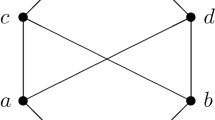Abstract
This paper investigates a generalization of Boolean algebras which I call agglomerative algebras. It also outlines two conceptions of propositions according to which they form an agglomerative algebra but not a Boolean algebra with respect to conjunction and negation.
Similar content being viewed by others
Change history
14 October 2020
The original version of the article unfortunately contained a few mistakes.
References
Bergman, C., & Romanowska, A. (1996). Subquasivarieties of regularized varieties. Algebra Universalis, 36(4), 536–63.
Caie, M., Goodman, J., Lederman, H. (forthcoming). Classical opacity. Philosophy and Phenomenological Research.
Ferguson, T.M. (2017). Meaning and proscription in formal logic: variations on the propositional logic of William T. Parry. Berlin: Springer.
Fine, K. (1977). Properties, propositions and sets. Journal of Philosophical Logic, 6(1), 135–191.
Fine, K. (1986). Analytic implication. Notre Dame Journal of Formal Logic, 27(2), 169–179.
Lewis, D. (1988). Statements partly about observation. Philosophical Papers, 17(1), 1–31.
McCune, W. (2005–2010) Prover9 and Mace4. http://www.cs.unm.edu/mccune/prover9/.
Parry, W.T. (1933). Ein axiomensystem für eine neue art von implikation (analytische implikation). Ergebnisse eines mathematischen Kolloquiums, 4, 5–6.
Parry, W.T. (1989). Analytic implication; its history, justification and varieties. In Norman, J., & Sylvan, R. (Eds.) Directions in relevance logic (pp. 101–18). Dordrecht: Kluwer Academic Publishers.
Płonka, J. (1984). On the sum of a direct system of universal algebras with nullary polunomials. Algebra Universalis, 19, 197–207.
Williamson, T. (2013). Modal logic as metaphysics. Oxford: Oxford University Press.
Yablo, S. (2014). Aboutness. Princeton: Princeton University Press.
Yalcin, S. (2011). Nonfactualism about epistemic modality. In Egan, A., & Weatherson, B. (Eds.) Epistemic modality (pp. 295–332). Oxford: Oxford University Press.
Yalcin, S. (2018). Belief as question sensitive. Philosophy and Phenomenological Research, 97(1), 23–47.
Acknowledgments
I am grateful to Cian Dorr, Peter Fritz, Harvey Lederman, and Steve Yablo for their extremely helpful comments on earlier versions of this paper, to Branden Fitelson for introducing me to Prover9, and to Arc Kocurek for helping me draw the figure accompanying Example 61.
Author information
Authors and Affiliations
Corresponding author
Rights and permissions
About this article
Cite this article
Goodman, J. Agglomerative Algebras. J Philos Logic 48, 631–648 (2019). https://doi.org/10.1007/s10992-018-9488-8
Received:
Accepted:
Published:
Issue Date:
DOI: https://doi.org/10.1007/s10992-018-9488-8




